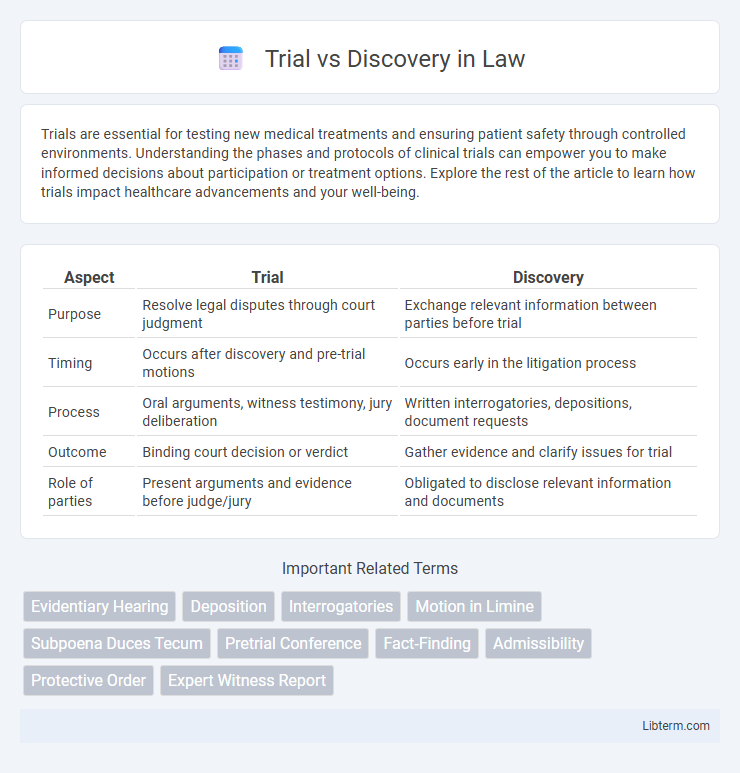Trials are essential for testing new medical treatments and ensuring patient safety through controlled environments. Understanding the phases and protocols of clinical trials can empower you to make informed decisions about participation or treatment options. Explore the rest of the article to learn how trials impact healthcare advancements and your well-being.
Table of Comparison
| Aspect | Trial | Discovery |
|---|---|---|
| Purpose | Resolve legal disputes through court judgment | Exchange relevant information between parties before trial |
| Timing | Occurs after discovery and pre-trial motions | Occurs early in the litigation process |
| Process | Oral arguments, witness testimony, jury deliberation | Written interrogatories, depositions, document requests |
| Outcome | Binding court decision or verdict | Gather evidence and clarify issues for trial |
| Role of parties | Present arguments and evidence before judge/jury | Obligated to disclose relevant information and documents |
Understanding Trials and Discovery: Key Differences
Trial and discovery are integral phases of the litigation process, each serving distinct purposes and procedures. Discovery involves the pre-trial exchange of evidence through depositions, interrogatories, and document requests to build the case foundation. Trials, on the other hand, are the formal court proceedings where parties present evidence and arguments before a judge or jury for a final legal resolution.
The Purpose of Discovery in Legal Proceedings
The purpose of discovery in legal proceedings is to enable both parties to gather relevant information and evidence before trial. Discovery ensures transparency by allowing each side to request documents, depositions, and interrogatories that clarify the facts and legal issues. Effective discovery minimizes surprises at trial, facilitates settlement negotiations, and promotes a fair adjudication process.
Overview of the Trial Process
The trial process begins with jury selection, followed by opening statements where both parties outline their cases. Evidence is presented through witness testimony and exhibits, and cross-examinations challenge the credibility of the information. The trial concludes with closing arguments and jury deliberation, resulting in a verdict that resolves the dispute.
Discovery Phase: Techniques and Tools
The Discovery Phase in legal proceedings employs techniques such as depositions, interrogatories, requests for production, and subpoenas to gather relevant evidence. Advanced tools like e-discovery software and predictive coding streamline document review, enabling efficient identification and analysis of pertinent information. These methods and technologies reduce case uncertainty and support informed decision-making before trial.
What Happens During a Trial?
During a trial, both parties present evidence, call witnesses, and make legal arguments to a judge or jury who then evaluate the facts and apply the law to reach a verdict. The process includes opening statements, witness examinations, cross-examinations, and closing arguments. Judges oversee courtroom procedures to ensure fairness and adherence to legal standards throughout the trial.
Types of Evidence in Discovery vs. Trial
Discovery involves the exchange of various types of evidence, including documents, depositions, interrogatories, and electronically stored information (ESI) to build a case before trial. In contrast, a trial emphasizes the presentation of evidence such as witness testimony, physical exhibits, expert reports, and demonstrative evidence to persuade the judge or jury. Evidence obtained during discovery must comply with rules of relevance and admissibility to be introduced effectively at trial.
The Role of Attorneys: Discovery vs. Trial Preparation
Attorneys play a critical role in both discovery and trial preparation, with discovery focused on gathering, analyzing, and organizing evidence to build a strong case foundation. During discovery, lawyers utilize depositions, interrogatories, and document requests to uncover facts and assess the strengths and weaknesses of the opponent's position. Trial preparation shifts towards developing persuasive arguments, crafting opening statements, preparing witness examinations, and strategizing courtroom presentation to effectively advocate for their clients.
Timelines: Discovery Period vs. Trial Duration
The discovery period typically spans several months to over a year, depending on case complexity and court schedules, allowing parties to gather evidence and information. Trial duration is generally shorter, lasting from a few days to several weeks, as it involves presenting evidence and legal arguments before a judge or jury. Efficient management of the discovery timeline directly impacts the overall trial preparation and can influence the final resolution speed of a case.
Challenges and Pitfalls in Discovery and Trial
Challenges in discovery often include managing large volumes of electronically stored information (ESI), ensuring compliance with complex legal rules such as the Federal Rules of Civil Procedure, and addressing issues of privilege and confidentiality. Pitfalls in trial may arise from inadequate preparation of evidence gathered during discovery, misinterpreting procedural requirements, and ineffective presentation of facts to the jury. Both phases require strategic planning to minimize risks related to incomplete disclosures, spoliation of evidence, and evidentiary objections.
Impact of Discovery Outcomes on Trial Verdicts
Discovery outcomes critically shape trial verdicts by providing essential evidence that frames the legal arguments and influences jury perception. Comprehensive discovery uncovers documents, witness testimonies, and expert analyses that can confirm or undermine case claims, directly affecting the judge's or jury's decision-making process. Ineffective or incomplete discovery often leads to unfavorable trial outcomes due to gaps in evidence or inability to refute opposing arguments.
Trial Infographic

 libterm.com
libterm.com